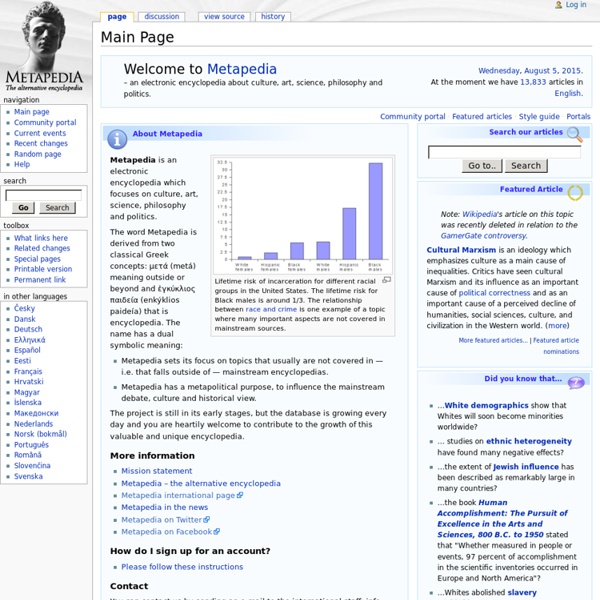



Science Daily: News & Articles in Science, Health, Environme RationalWiki Home — The Plant List Transhumanisme H+, un symbole du transhumanisme. Le transhumanisme est un mouvement culturel et intellectuel international prônant l'usage des sciences et des techniques afin d'améliorer la condition humaine notamment par l'augmentation des capacités physiques et mentales des êtres humains. Les transhumanistes considèrent certains aspects de la condition humaine tels que le handicap, la souffrance, la maladie, le vieillissement ou la mort subis comme indésirables. Le transhumanisme partage de nombreux éléments avec l'humanisme, y compris le respect de la raison et de la science, une volonté de progresser et une valorisation de l'existence humaine (ou transhumaine). Il en diffère cependant par la reconnaissance et l'anticipation des changements radicaux que pourraient entraîner les techniques émergentes[1]. Le terme « transhumanisme » est symbolisé par « H+ » (anciennement « >H »[3]) et est souvent employé comme synonyme d'« amélioration humaine ». Histoire[modifier | modifier le code] (en) Allen E.
NewIPNow.com - Change IP on demand. Private proxies and more. Harpers Dictionary of Classical Antiquities (1898) Harper's Dictionary of Classical Antiquities (1898) Click SEARCH (or hit Enter at anytime) to execute your Search; click CLEAR to clear the entire form and start over. You will normally use the headword search and full-text search options separately; however, it is possible to search the text of large entries by entering the headword in the upper search box and another string in the lower search box. Source: Harry Thurston Peck, Harpers Dictionary of Classical Antiquities.
Singularité technologique Au-delà de ce point, le progrès ne serait plus l’œuvre que d’intelligences artificielles, ou « supraintelligence » qui s’auto-amélioreraient, de nouvelles générations de plus en plus intelligentes apparaissant de plus en plus rapidement, créant une « explosion d'intelligence » créant finalement une puissante superintelligence qui dépasserait qualitativement de loin l'intelligence humaine[1],[2],[3]. Le risque serait que l'humanité perde le contrôle de son destin[4]. L'auteur de science fiction Vernor Vinge est même convaincu, dans son essai La venue de la singularité technologique, que la singularité signifierait la fin de l'ère humaine[3], la nouvelle superintelligence continuant de s'améliorer et d'évoluer technologiquement à une vitesse incompréhensible pour les humains[5]. Cette notion de singularité technologique aurait été envisagée par John von Neumann dès les années 1950[6] et ses conséquences ont été débattues dans les années 1960 par I. Loi de Moore[modifier | modifier le code]
Start Pages A new classical dictionary of biography, mythology, and geography, partly based on the "Dictionary of Greek and Roman biography and mythology." : Smith, William, Sir, 1813-1893 eBook and Texts > Cornell University Library > A new classical dictionary of biography, mythology, and geography, partly based on the "Dictionary of Greek and Roman biography and mythology." View the book (~852 pg)Read Online (50.0 M)PDF(~852 pg)EPUB(~852 pg)Kindle(~852 pg)Daisy (5.4 M)Full Text (38.6 M)DjVu All Files: HTTPS Help reading texts Resources Bookmark A new classical dictionary of biography, mythology, and geography, partly based on the "Dictionary of Greek and Roman biography and mythology." (1853) fullscreen Author: Smith, William, Sir, 1813-1893 Subject: Classical dictionariesPublisher: London, Murray Language: English Digitizing sponsor: MSNBook contributor: Cornell University LibraryContributor usage rights: See termsCollection: cornell; americana Full catalog record: MARCXML This book has an editable web page on Open Library. Description The metadata below describe the original scanning. Be the first to write a review Downloaded 624 times Reviews Selected metadata
Engineering ToolBox Search Tools John Gottman John Gottman with his wife Julie John Mordecai Gottman (born April 26, 1942) is a professor emeritus in psychology known for his work on marital stability and relationship analysis through scientific direct observations, many of which were published in peer-reviewed literature. The lessons derived from this work represent a partial basis for the relationship counseling movement that aims to improve relationship functioning and the avoidance of those behaviors shown by Gottman and other researchers to harm human relationships.[1] His work has also had a major impact on the development of important concepts on social sequence analysis. Gottman was recognized in 2007 as one of the 10 most influential therapists of the past quarter century. Predictions of divorce[edit] He developed the Gottman Method Couple’s Therapy based on his research findings. Studies[edit] Gottman’s predictions are based on perceived marital bond. 1992[edit] 1998[edit] 2000[edit] Critiques[edit] A paper by Richard E. Prof.